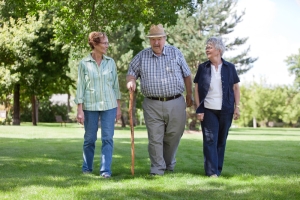Helping Caregivers Help Themselves
September 22, 2016 / by Vincent Lim- Giving
- Research
Many family caregivers report positive benefits from caregiving including developing a greater sense of purpose in one’s life, but caregiving can also be a source of physical and emotional stress.
Findings from several studies suggest that many family caregivers suffer from mental health problems. Some research shows that between 40 to 70 percent of caregivers have clinical symptoms of depression.
A research team led by María Aranda, an associate professor at the USC Suzanne Dworak-Peck School of Social Work and a senior scientist with the USC Edward R. Roybal Institute on Aging, will test a pilot psychosocial intervention aimed at increasing the physical and psychological well-being of family caregivers through self-care management in Los Angeles County.
Los Angeles County is home to more than 30,000 informal caregivers of older adults—one of the largest groups of caregivers in the nation.
“We are home to many family caregivers who selflessly put their well-being ahead of those who they care for on a regular basis and whose needs are often neglected,” Aranda said. “We want to help them better care for themselves, which we hope will also allow them to better care for their loved ones.”
The intervention is supported by a two-year grant from the California Community Foundation, which strives to lead positive systemic change to strengthen Los Angeles communities. It has served as a public, charitable organization since 1915—empowering donors to pursue their own personal passions and to collaborate in transforming Los Angeles.
Family caregivers are among the nearly 40 million unpaid, informal caregivers in the United States who attend to the needs of individuals suffering from illness, injury or disability. The majority of in-home care in the United States is provided by family members.
As the U.S. older adult population increases, there will be a growing need to support those who care for aging relatives with various chronic conditions. In Los Angeles County, the population of individuals age 65 and older is expected to grow 43 percent by 2020, and the number of older adults with chronic illness is also growing rapidly.
Culture and caregiving
Racially and ethnically diverse populations face additional caregiving challenges. Caregivers may have to navigate complex health care systems and struggle to find affordable health care that meets the linguistic as well as cultural needs of the person under care.
Few family caregiver interventions are tailored to low-English proficiency individuals. Almost 50 percent of Los Angeles County is Latino, and 73 percent speak English less than “very well.”
The self-care intervention will be tested with both English- and Spanish-speaking family caregivers in Los Angeles.
“With large and growing Latino and older adult populations in Los Angeles, there will be a growing need for these types of cultural and linguistic interventions,” Aranda said.
The research team will develop research partnerships with community-based and healthcare organizations in Los Angeles County that serve family caregivers. Several Los Angeles County-based non-profit organizations are funded to provide services to this target population in the form of information and referrals, caregiver intervention programs and/or respite care.
“We hope the intervention can become a national model for how we can best support the needs of family caregivers from diverse ethnic and racial backgrounds through self-care,” Aranda said.
Aranda is a national expert on the mental health needs of older adults and family caregivers. She is a member of the AARP Caregiving Advisory Panel and currently serves on a National Academy of Medicine committee that has offered recommendations for public and private sector policies to support the capacity of family caregivers to perform critical caregiving tasks.
To reference the work of our faculty online, we ask that you directly quote their work where possible and attribute it to "FACULTY NAME, a professor in the USC Suzanne Dworak-Peck School of Social Work” (LINK: https://dworakpeck.usc.edu)
